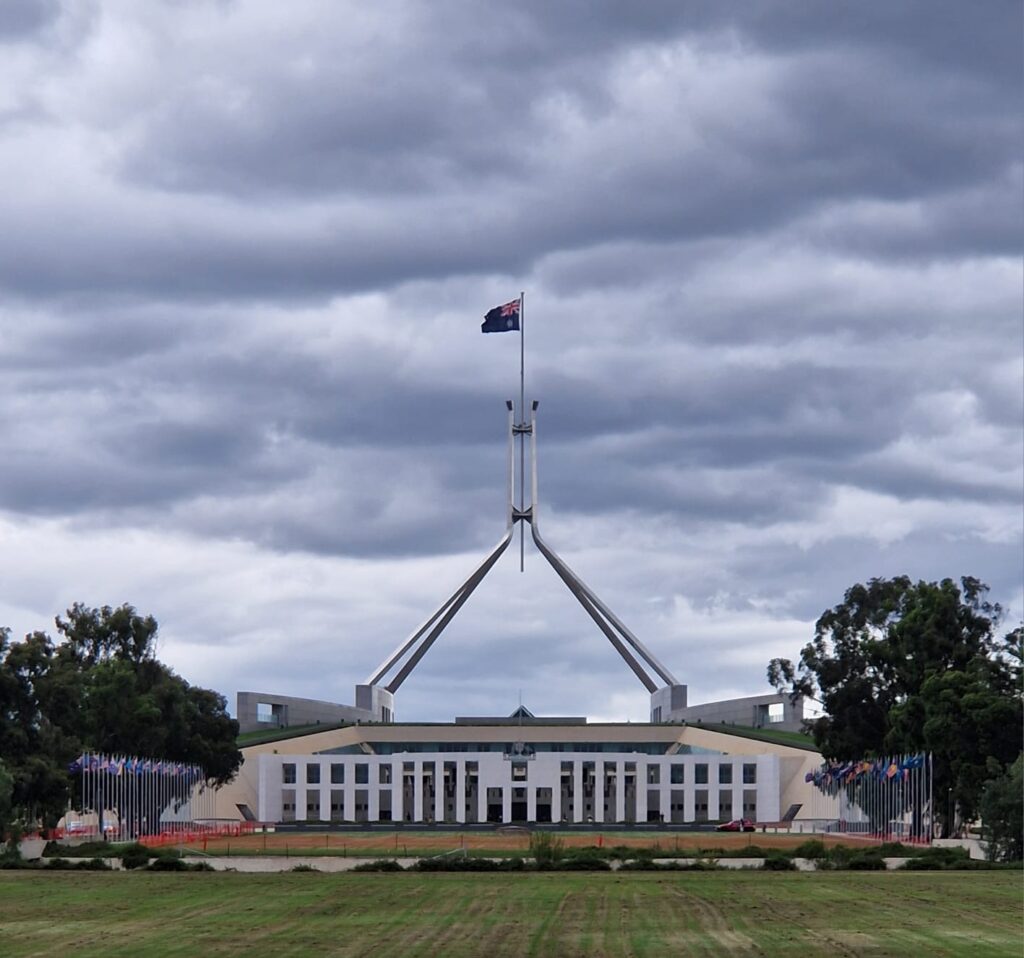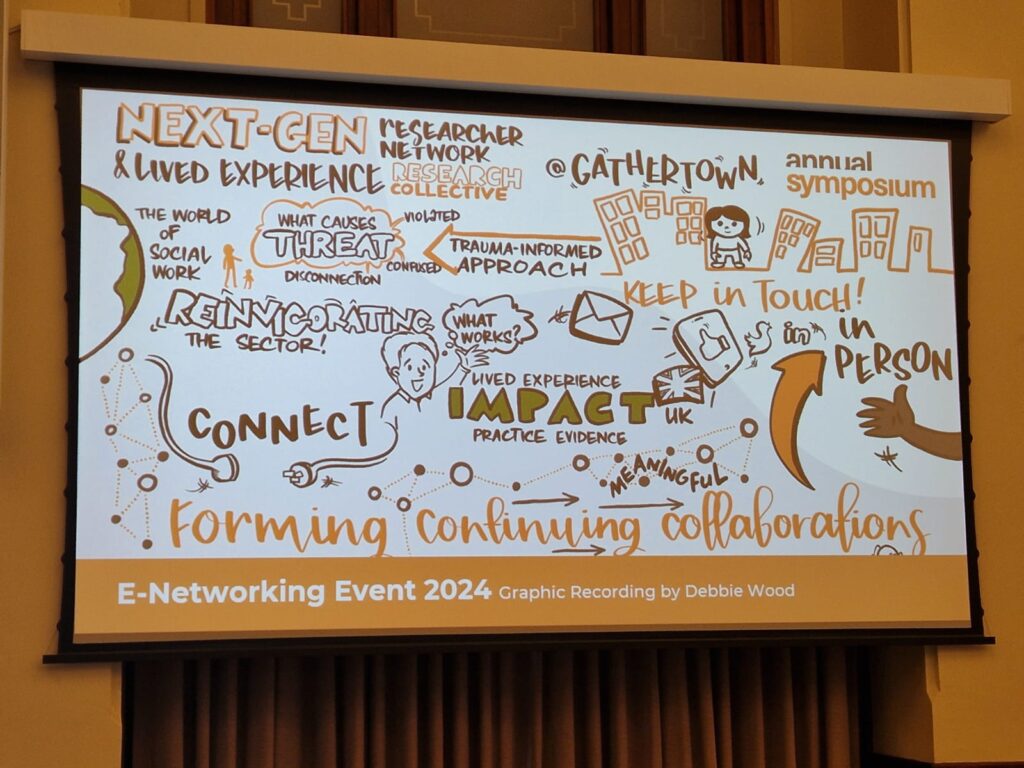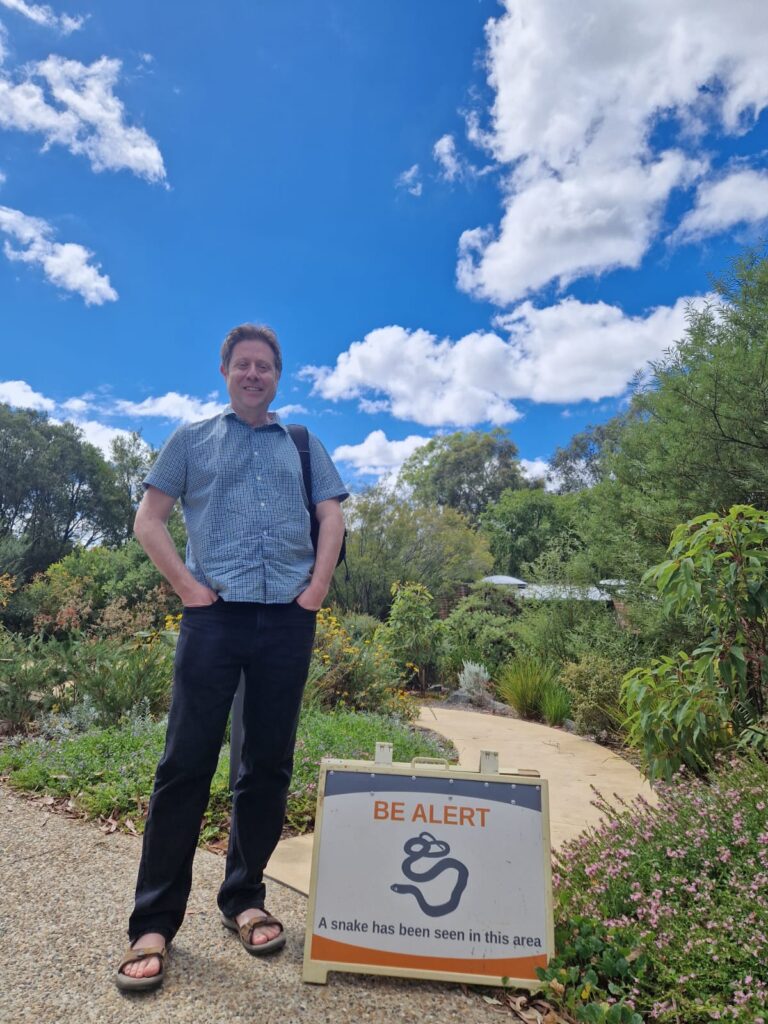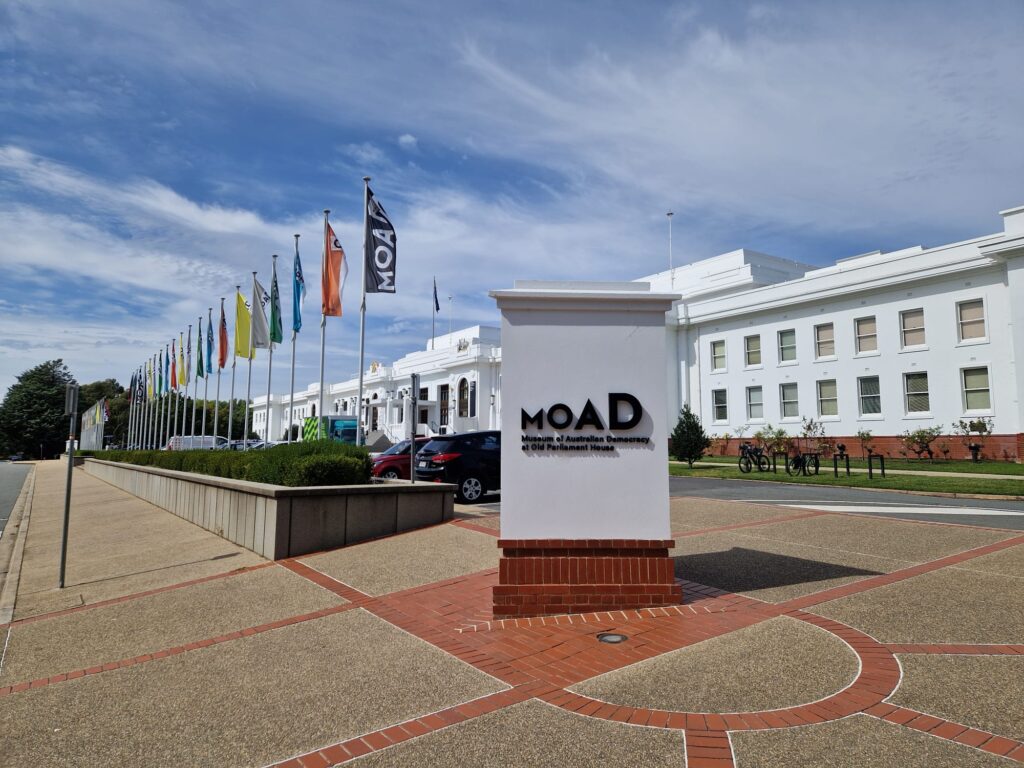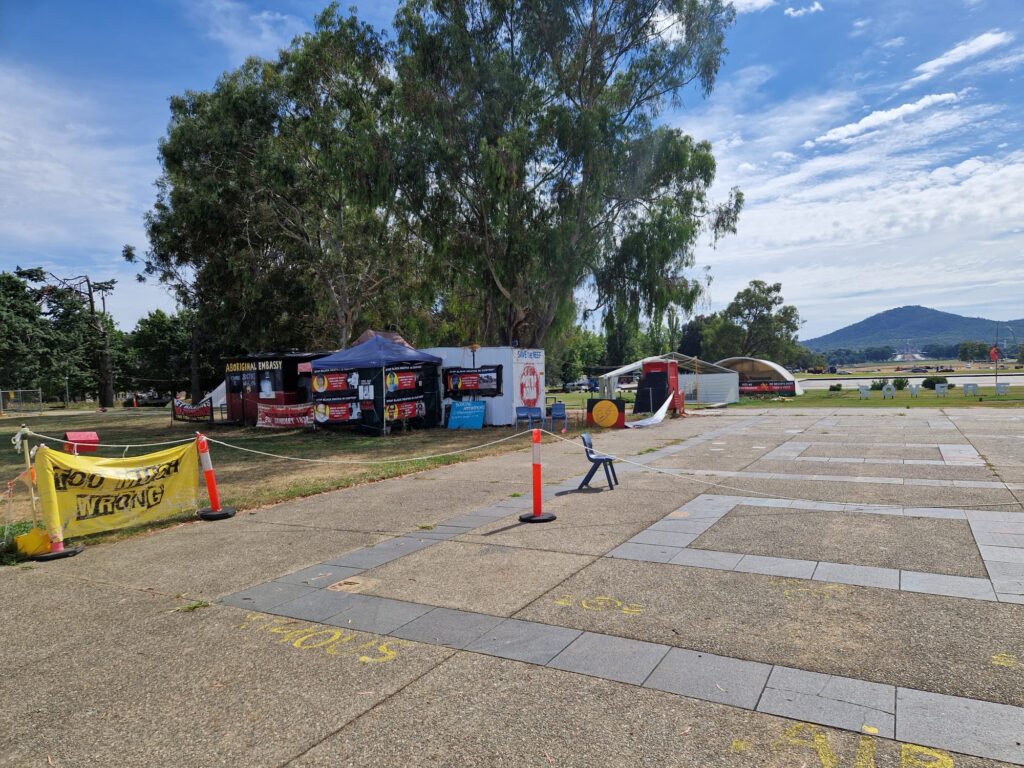Jon Glasby, IMPACT’s Director, has been in Australia representing IMPACT at the annual symposium of the ALIVE National Centre for Mental Health Research Translation. He has shared some reflections on his visit, as well as some photos.
This Spring, I was very fortunate to be able to travel to Melbourne and Canberra to represent IMPACT at the annual symposium of the ALIVE National Centre for Mental Health Research Translation. I’d like to acknowledge the Traditional Owners of the land on which I was based, and pay respect to Elders past and present to recognise the continuing cultural connection to Country.
The ALIVE National Centre is a national network of 17 Australian Universities, working with people with lived experience and practice partners to research and implement new ways of working in mental health services. We were invited to give a keynote speech as a centre with a similar ethos and values, learning from ALIVE National’s work and sharing our own approaches.
Reflecting on IMPACT’s work
Like all these things, in trying to explain and answer questions on what you do, you start to take stock and make sense of your own work, seeing IMPACT through different eyes. During the session, lots of people seemed particularly interested and energised by:
- IMPACT’s definition of evidence including insights from research, lived experience and practice knowledge.
- The focus not on creating new evidence, but on providing practical support to help implement the evidence we already have. This was seen as the missing ingredient in too much recent research and policy, and hence why so many previous initiatives haven’t had the impact that people hoped.
- Our concept of ‘national embedding’ (where we try to take what we’ve learned from local projects and find ways to influence national policy and practice, so that we scale innovation not just by telling people about it, but by finding ways to build it in to how social care ‘gets done’).
- The way we work to promote co-production, value lived experience and tackle power imbalances.
- The breadth and depth of what IMPACT is doing, across four nations and in a complex, often fragmented context.
Despite the latter point, there was a degree of good-natured and not unreasonable banter around our IMPACT Network on rural social care – with a gentle observation that ‘rural and remote’ might mean slightly different things in our two countries! For context, the Northern Territory alone is about twice the size of France, and has about 245,000 people in an area of over 1.3m square kilometres. Given that Melbourne Cricket Ground (which I also got to visit for my first ever game of Aussie Rules!) has capacity of about 100,000, you could fit the whole population into two and a half MCGs…
Many of the themes from our session were brilliantly captured by Debbie Wood, a live illustrator who helps to get beyond the detail and distill the key issues behind what’s being discussed. In true Australian fashion, she was kind enough to say that we could “share the sh*t out of it” (local phrase – translation: “you’d be very welcome to share, please go ahead”) – so here goes:
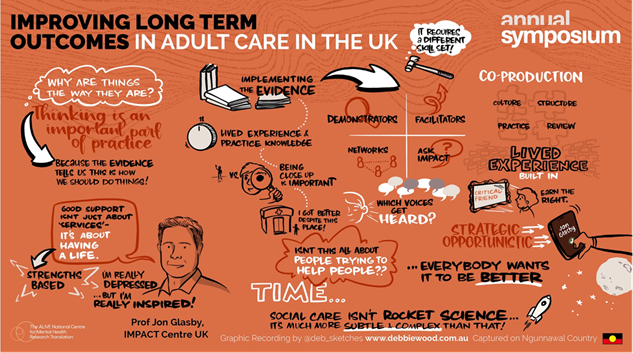
People were incredibly welcoming and hospitable, so might just have been being nice – but they seemed to feel that IMPACT’s design and contribution is genuinely impressive (and helpful to others) on an international stage. When you’re in the middle of running a large national centre with lots of moving parts in a sector that is often under-funded, neglected and somewhat beleaguered, this opportunity to take a step back was really appreciated – and to know that some of what we’ve been trying to do is seen in this way by others was genuinely humbling.
Learning from others
Although we were invited to visit to share good practice, we also learned loads from our hosts. It will take me some time to do justice to all this, and my thoughts are still racing – but there were at least two very powerful insights that came up time and again.
- First of all, ALIVE National has a programme of research on the experience, perspectives and expertise of Aboriginal and Torres Strait Islander peoples – and the symposium was much more spiritual than an event in the UK would have been. Throughout, there was a really strong recognition of the interconnectedness of people, family, community and the environment, and of past, present and future. Indigenous people at the symposium described this to me as being about ‘Country’ (not just the physical land, waterways and seas – but a sense of identity, of belonging and of deep, deep connections). In the UK, we often talk about ‘place-based approaches’, ‘well-being’, ‘communities’ and being ‘holistic’ – but ‘Country’ was somehow more profound and more fundamental than any of these. This observation has to also acknowledge me sitting in the seat of the colonial powers too.
- Second, a key theme was about power and ownership. We were meeting in the Old Parliament, now home to the Museum of Australian Democracy. Everyone there was very conscious of the history of the rooms we were in: ‘places where old white men committed so many atrocities’, as the Elder who gave the Welcome to Country described it. Only a few hundred yards away was the current Parliament, and the Aboriginal Tent Embassy, begun in 1972 and thought to be the longest protest for Indigenous land rights, sovereignty and self-determination in the world.
During the symposium, there was a strong focus on social justice, trying to make up for past wrongs, better understanding each other and building trust and new relationships to help make things a bit better in future. I was just a visitor – and from a country responsible for such colonisation, at that – but it was humbling to be a part of such respectful and hopefully healing relationships. Even from the very start of the symposium, we were welcomed onto the land by Aunty Dr Matilda House-Williams, a Ngambri, Wallabalooa and Wiradjuri elder. She was one of the original protesters who established the Aboriginal Tent Embassy, has performed the Welcome to Country Ceremony for visitors such as Nelson Mandela and the Dalai Lama, and became the first person to perform it at the opening of the Australian Parliament (on the eve of the National Apology to the Stolen Generations in 2008).
Later on, we got to spend time with the Ngaanyatjarra Pitjantjatjara Yankunytjatjara (NPY) Women’s Council – female leaders in bicultural mental health programmes using creative arts and visual media and providing human services across 26 desert communities in the cross-border regions of Western Australia, South Australia and the Northern Territory. In spite of all the injustices they have suffered, many of their values would work well in a UK social care context too:
- Piluntjungku: peaceful and calm
- Ngapartji ngapartjiku kulira iwara wananma tjukarurungku: respect each other and follow the law straight
- Kututu mukulyangku: kind-hearted
- Kunpungku: strong
- Kalypangku: conciliatory
- Tjungungku: united
Focusing on what really matters
The symposium finished with a Call to Action, generated bottom-up by the people and families, policy and practice partners, and researchers who took part. There is a framework from the Australian Treasury called ‘Measuring What Matters’ – and ALIVE has taken the spirit of this, but adapted it to focus on what really matters, and for whom. In our group, as an example, one of the policy pledges is that people need access to high quality support, and we spent time on working through what ‘high quality’ actually means, and how you go about delivering it in practice. For many of the people and families taking part, this wasn’t necessarily about clinical expertise, formal service models or significant budgets (although all of these can play a crucial role). Instead, people wanted something that focused on helping them live their lives; that recognised their time in services was just a chapter, and didn’t define them; and that gave them hope. They also felt that ‘quality services’ are delivered by ‘quality people’ – not just in terms of their skills and experience, but in how they make people feel and help to re-humanise a system which too many people find scary and distressing. You can read the Call to Action here: https://simplebooklet.com/castingthenetforwhatmattersandforwhomacalltoaction.
Taking stock
This was just a wonderful trip – and it’s amazing how you can travel half-way around the world to find like-minded friends and colleagues trying to do similar things in similar ways. While I’m sure that both IMPACT and ALIVE will do some things really well, but also make mistakes and get some things wrong en route – perhaps they’re both needed because traditional approaches haven’t worked, and something new is required to help us move forwards together. No one person or group will be able to do this by themselves – hence the importance of connections, relationships, trust, inclusion, openness, respecting different perspectives and finding ways to reduce power imbalances.
